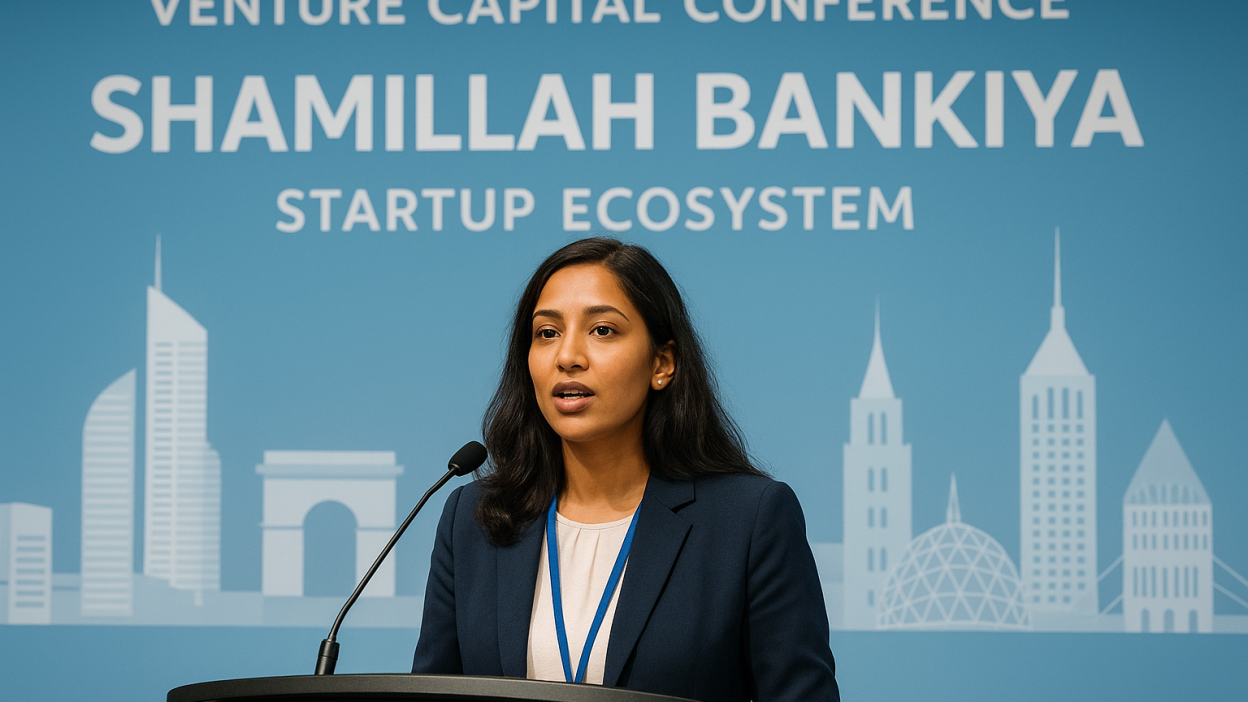Shamillah Bankiya of Dawn Capital Unveils Insights into Europe’s Venture Market Trends
Europe’s venture capital landscape is evolving rapidly, shaped by global economic shifts, technological breakthroughs, and a renewed focus on sustainability and societal impact. In this dynamic context, Shamillah Bankiya of Dawn Capital provides a unique perspective on the state of the European venture market, offering insights that blend analytical rigor with humanized understanding.
Venture capital is more than capital allocation—it is the lifeblood of innovation. Europe has emerged as a fertile ground for startups, with sectors like fintech, healthtech, green energy, and AI attracting record investments. Yet, the market faces challenges: macroeconomic uncertainty, regulatory fragmentation across countries, and a need to scale startups effectively to compete with global giants. Bankiya’s insights illuminate how investors, founders, and policymakers are navigating these complexities, providing a roadmap for sustainable growth.
From a human perspective, venture funding drives more than business outcomes—it shapes careers, communities, and societal progress. By understanding the trends and underlying forces in Europe’s venture ecosystem, stakeholders can make better-informed decisions that balance profit with purpose. Bankiya’s analysis not only highlights market dynamics but also underscores the human stories behind funding decisions—the founders, employees, and end-users whose lives are touched by innovative startups.
Overview of the European Venture Market
Europe’s venture capital market has undergone substantial growth over the past decade. According to Invest Europe, total venture funding in the region reached over €50 billion in 2024, with notable hubs in London, Berlin, Paris, and Stockholm. The market’s expansion is driven by several factors: increased availability of late-stage funding, strong governmental support for innovation, and a rising number of high-quality startups capable of scaling internationally.
Bankiya notes that while the market has matured, challenges remain. Regulatory diversity across countries creates friction for pan-European scaling, and many startups struggle to raise follow-on funding after seed and Series A rounds. Moreover, macroeconomic uncertainty—ranging from inflationary pressures to geopolitical tensions—affects both investor confidence and startup valuations.
Despite these hurdles, opportunities abound. Emerging sectors such as climate-tech, AI-powered SaaS solutions, and digital health are attracting significant attention. Startups that prioritize societal impact alongside profitability are increasingly favored by investors, reflecting a shift in venture philosophy. Bankiya emphasizes that understanding these trends is critical not just for capital allocation but for supporting ventures that generate tangible benefits for communities and industries alike.
Human impact is at the center of this narrative. Venture-backed startups create employment, foster innovation ecosystems, and contribute to societal well-being. Bankiya’s insights remind us that the European venture market is not just an economic engine—it is a vehicle for human progress, innovation, and long-term societal transformation.
Key Trends Shaping Venture Capital in Europe
Shamillah Bankiya identifies several trends that define the current European venture market:
-
Rise of Impact-Driven Investments: Investors are increasingly prioritizing ventures with measurable societal or environmental impact. Climate-tech, sustainable logistics, and healthtech startups are benefiting from this trend.
-
Consolidation and Late-Stage Funding: As startups scale, the need for Series B and C funding has grown, leading to larger, more concentrated investment rounds.
-
Technological Innovation: AI, blockchain, and automation are attracting substantial funding, reshaping industries from finance to manufacturing. Startups leveraging these technologies often command higher valuations due to their disruptive potential.
-
Cross-Border Expansion: European startups are increasingly eyeing global markets early in their lifecycle. However, cross-border scaling requires navigating complex regulatory, cultural, and operational landscapes.
-
Investor Diversity and Inclusion: More women-led and minority-led ventures are receiving attention, reflecting a broader commitment to inclusive innovation.
Bankiya underscores that these trends are interconnected. For instance, impact-driven investments often attract tech-enabled solutions that are scalable across borders. Similarly, investor diversity enhances market resilience by introducing varied perspectives and approaches to problem-solving.
A practical example can be seen in the rise of climate-tech startups in Germany. Firms developing energy-efficient industrial solutions have received multi-million euro funding rounds, benefiting not only investors with strong ROI potential but also contributing to Europe’s decarbonization goals. This demonstrates how venture capital, guided by strategic insight, can simultaneously drive economic and societal value.
Challenges Facing the European Venture Market
While growth is evident, Bankiya points out that European venture capital faces notable challenges:
-
Regulatory Fragmentation: Differing national regulations create hurdles for pan-European expansion, slowing down startups with international ambitions.
-
Valuation Pressure: Economic uncertainty affects valuations, making it harder for investors and founders to agree on funding terms.
-
Talent Shortages: High-tech startups face stiff competition for skilled talent, particularly in AI, software development, and data science.
-
Exit Market Limitations: Compared to the U.S., Europe has a smaller IPO market, which can limit liquidity options for investors.
These challenges have human implications. Startups often struggle with operational stress, workforce retention, and strategic decision-making under pressure. Bankiya emphasizes the importance of thoughtful capital allocation, mentorship, and ecosystem support to ensure that high-potential ventures not only survive but thrive.
Solutions are emerging. Cross-border accelerators, government incentives, and EU-wide regulatory harmonization efforts are gradually addressing fragmentation. Venture funds are increasingly offering operational support to portfolio companies, helping founders navigate talent, compliance, and scaling challenges.
Bankiya’s perspective reflects the human side of venture investing: beyond numbers and valuations, it is about fostering resilient teams, supporting founders’ visions, and ensuring that innovation leads to real-world impact.
Opportunities and Future Outlook
According to Bankiya, several opportunities will define the next phase of Europe’s venture capital evolution:
-
Sustainable and Climate-Tech Investments: Startups addressing climate change, clean energy, and sustainable supply chains are expected to see significant inflows.
-
AI and Deep-Tech Growth: AI-powered automation, healthtech diagnostics, and advanced manufacturing solutions present lucrative investment opportunities.
-
Pan-European Collaboration: Increased cooperation among investors, incubators, and governments can enable startups to scale efficiently across borders.
-
Inclusive and Diverse Founders: Funding more diverse leadership teams not only promotes equity but often leads to more innovative and resilient companies.
Bankiya stresses that the venture ecosystem’s success hinges on balancing economic returns with societal benefits. Smart capital allocation can accelerate technological adoption, create jobs, and contribute to sustainable urban and regional development.
A real-world illustration is the European AI healthcare market. Startups developing predictive diagnostics solutions are attracting multi-million euro funding while simultaneously improving patient outcomes and easing pressure on healthcare systems. This dual impact highlights how venture capital can align financial incentives with societal good.
Human reflections are central. Startups are not just economic entities—they are communities of innovators, employees, and end-users whose lives are touched by each funding decision. Bankiya emphasizes that responsible investing requires understanding both market mechanics and human consequences.
Lessons for Investors and Founders
Shamillah Bankiya offers practical advice for navigating the European venture market:
-
For Investors: Focus on sectors with both growth potential and societal impact. Leverage operational support to help portfolio companies scale. Consider regulatory and cultural nuances for cross-border investments.
-
For Founders: Prioritize resilience, build scalable business models, and maintain transparency with investors. Engage with diverse ecosystems to access mentorship, talent, and funding.
-
For Policymakers: Simplify regulatory frameworks, incentivize impact-driven innovation, and support programs that develop high-skill talent pipelines.
These lessons reflect a holistic approach to venture capital—one that integrates financial, operational, and human perspectives. Bankiya’s insights suggest that Europe’s venture market can thrive not only by raising capital but by creating ecosystems that empower founders, employees, and communities.
Case studies of successful European startups, such as fintech platforms scaling across multiple countries or climate-tech firms leveraging EU incentives, demonstrate the effectiveness of these strategies. They reveal that thoughtful investment, strategic mentorship, and ecosystem engagement can turn high-potential ideas into transformative companies.
Shamillah Bankiya’s insights offer a comprehensive view of Europe’s venture market—its opportunities, challenges, and human impact. The European ecosystem is maturing, fueled by technological innovation, sustainable investment trends, and inclusive entrepreneurship. Yet, navigating regulatory complexity, talent scarcity, and valuation pressures requires informed strategies, operational support, and ecosystem collaboration.
The implications are profound: venture capital in Europe is not just about funding startups—it is about enabling innovation, creating jobs, and driving societal progress. By integrating human-centered considerations into investment decisions, investors and founders alike can contribute to a resilient, innovative, and impactful market.
Bankiya’s perspective reminds us that venture capital is ultimately a human endeavor. Behind each funding round are founders striving to realize visions, teams innovating under pressure, and communities benefiting from new technologies. Europe’s venture market, guided by thoughtful investment and strategic insight, holds the promise of sustainable growth, societal impact, and a vibrant ecosystem that will shape the future of innovation for years to come.
FAQs
1. Who is Shamillah Bankiya?
Shamillah Bankiya is a partner at Dawn Capital, a leading venture firm, offering insights into European startup trends and venture investment strategies.
2. What sectors are driving Europe’s venture capital growth?
Key sectors include fintech, healthtech, climate-tech, AI, and deep-tech startups, with a growing focus on impact-driven ventures.
3. What challenges does Europe’s venture market face?
Challenges include regulatory fragmentation across countries, talent shortages, limited IPO markets, and valuation pressures due to macroeconomic uncertainty.
4. How is the European venture market evolving?
The market is maturing with larger funding rounds, cross-border expansion, AI adoption, sustainable and inclusive investment trends, and increased late-stage financing.
5. Why is human impact important in venture investing?
Venture investments affect not just profits but also founders, employees, communities, and society, highlighting the need for responsible and inclusive capital allocation.
6. What opportunities exist for investors and founders?
Opportunities include scaling climate-tech and AI startups, engaging diverse founders, and leveraging EU-wide support and collaboration for cross-border growth.
7. How can Europe compete globally in venture capital?
By aligning capital with innovation, supporting high-quality founders, improving regulatory frameworks, and fostering inclusive, sustainable ecosystems.
Stay informed on European venture trends and investment insights. Subscribe to our newsletter for updates on startups, funding strategies, and innovation shaping Europe’s future.
Note: Logos and brand names are the property of their respective owners. This image is for illustrative purposes only and does not imply endorsement by the mentioned companies.



